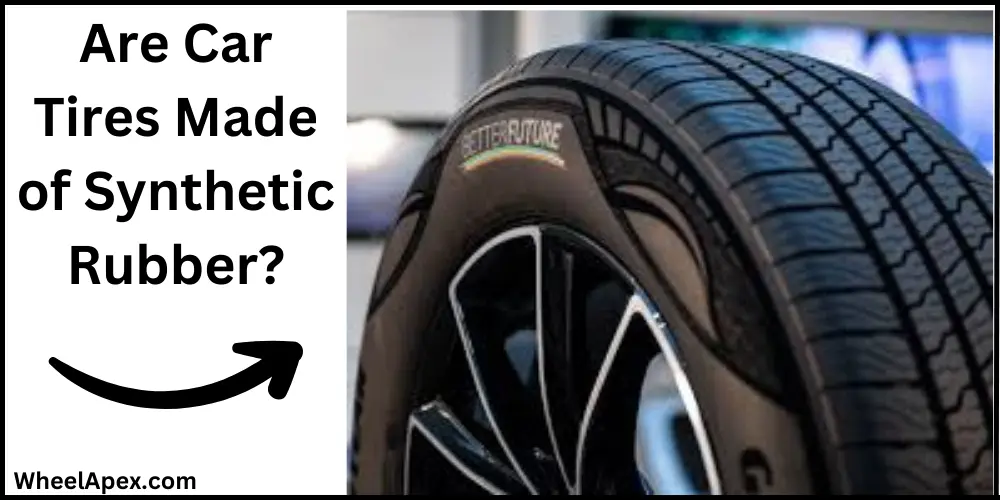Are Car Tires Made of Synthetic Rubber? As we dash down parkways or move through city roads, seldom do we think about the uncelebrated yet truly great individuals of our vehicles — the tires. These elastic wonders assume a basic part in guaranteeing a smooth and safe ride, however, have you at any point considered what lies under the surface for them? While regular elastic has been the customary decision, headways in innovation have introduced another time: engineered elastic.
In this article, we dig into the entrancing universe of vehicle tires, Are Car Tires Made of Synthetic Rubber, and investigate the predominance of manufactured elastic in their creation. Engineered elastic, a man-made substitute for regular elastic has changed the car business, offering a horde of benefits. From upgraded sturdiness to further developed execution in different weather patterns, engineered elastic has impelled tire assembling higher than ever.
Go along with us as we unwind the mysteries behind the structure and advantages of engineered elastic in vehicle tires, revealing insight into how this surprising material is forming the fate of our excursions out and about.
Are Car Tires Made Of Synthetic Rubber?
Vehicle tires are fundamental parts of any vehicle, guaranteeing security, execution, and solace out and about. While the vast majority of us know that tires are produced using elastic, there may be disarray concerning the kind of elastic utilized. We will dig into the arrangement of vehicle tires and investigate regardless of whether they are made of engineered elastic.
Yes, car tires are predominantly made of synthetic rubber compounds, which offer durability, traction, and resistance to wear and tear, enhancing overall performance and safety on the road.
Grasping Tire Organization

Present-day vehicle tires are intricate designs, painstakingly designed to give footing, strength, and protection from different street conditions. The ordinary tire comprises a few layers, each filling a particular need. These layers incorporate the track, sidewall, belts, dot, and internal liner. Notwithstanding, the essential material utilized in tire fabricating is certainly elastic.
Normal Elastic
Generally, vehicle tires were produced using normal elastic obtained from the sap of elastic trees. Normal elastic has astounding flexibility, versatility, and grasp, making it an ideal material for tire fabricating. It offers unrivaled execution as far as a foothold, street grasp, and dealing with, particularly in wet circumstances. Normal elastic additionally displays great intensity scattering properties, which adds to tire life span.
Engineered Elastic
In many years, the tire business has seen a critical shift toward the utilization of engineered elastic, derived from petrol-based synthetics. Engineered elastic, otherwise called elastomer, is a man-made substitute for regular elastic. It is delivered through a perplexing cycle called polymerization, where different synthetics are consolidated to make an elastic-like substance with wanted properties.
Benefits of Manufactured Elastic
The developing ubiquity of engineered elastic in tire assembling can be ascribed to a few benefits it offers over regular elastic. Engineered elastic, first and foremost, gives expanded strength and protection from wear, upgrading the tire’s life expectancy. It additionally shows amazing execution in outrageous temperatures, making it appropriate for different weather patterns.
Besides, manufactured elastic offers better compound obstruction, diminishing the impacts of ozone, UV radiation, and different synthetics found on street surfaces. This works on the tire’s protection from debasement and upgrades its general exhibition and security.
Mixing Normal and Manufactured Elastic

To enhance the advantages of both regular and engineered elastic, tire makers frequently utilize a mix of the two materials. By joining regular and engineered elastic, tire producers mean to work out some kind of harmony between execution, sturdiness, and cost viability. This mixing system permits them to fit the tire’s qualities as indicated by unambiguous necessities.
FAQs
Are Most Tires Made From Synthetic Rubber?
Most tires are produced using engineered elastic. Manufactured elastic offers a few benefits, including better solidness, protection from mileage, and improved execution qualities contrasted with normal elastic. This pursues the favored decision for assembling tires, guaranteeing well-being and effectiveness out and about.
Are Tires Made From Natural or Synthetic Rubber?
Tires are ordinarily produced using a blend of both regular and manufactured elastic. Regular elastic gives strength and grasp, while manufactured elastic improves toughness and life span. This mix permits tires to endure assorted weather patterns and street surfaces, finding some kind of harmony among execution and life span.
Why Are Car Tires Made of Synthetic Rubber?
Vehicle tires are made of manufactured elastic principally for toughness and execution. Engineered elastic can endure a great many temperatures, gives magnificent footing, and opposes mileage, making it ideal for different street conditions. Also, it takes into account exact tire synthesis to improve eco-friendliness, security, and dealing with.
Conclusion:
All in all, vehicle tires are to be produced using elastic, however, the synthesis has advanced over the long haul. While regular elastic was the transcendent decision before, current tires presently use manufactured elastic because of its improved strength, execution, and protection from different natural variables. The utilization of manufactured elastic has added to critical headways in tire innovation and has worked on general security and execution out and about.
It is critical to take note that the exact piece of vehicle tires can differ among makers and tire models. Thus, it is fitting to counsel explicit tire details and proposals given by producers while choosing tires for your vehicle.
Sources:
- By Tamil Selvan Natarajan Are automotive tires generally made of synthetic rubber or natural rubber? Posted 6 Years Ago.

